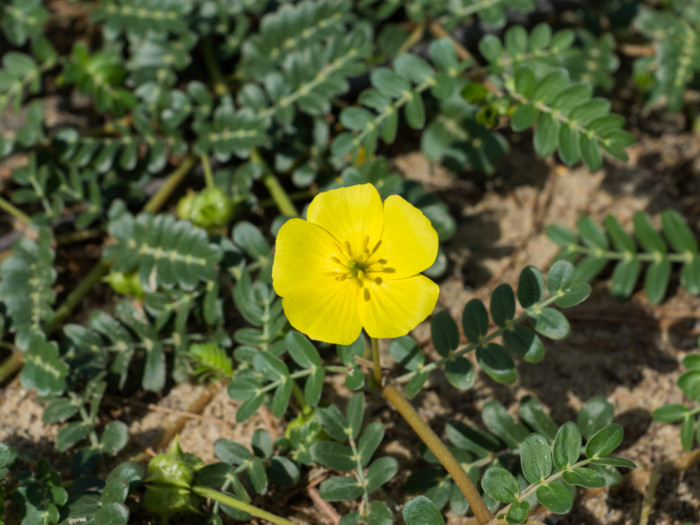The use of Tribulus Terrestris in the form of alternative medicine is common in certain parts of the world, and it has been relied on for thousands of years.
What is Tribulus Terrestris?
Tribulus Terrestris is an annual plant that often grows in dry, challenging conditions, and is seen as an invasive weed in certain regions, such as North America. This plant is known by many common names, including goat’s head, bullhead, bindii, caltrop, tackweed, and devil’s weed, among many others. All of the plant parts have been applied in traditional medicine, particularly in the Chinese and Ayurvedic traditions. After the flower of this plant blooms, it is soon followed by a small fruit composed of 4-5 nutlets, which act like burs. There are sharp spines on the outside of these nutlets, but the seeds inside are a source of nutrients. [1]
Whether creating a decoction, an herbal tea of the dried leaves, or a powder of the nutlets and seeds, this plant contains various sterols, saponins, and beta-sitosterol, which can have measurable antioxidant and anti-inflammatory effects on the body. This herbal remedy also contains adaptogens, specialized compounds that can help your body learn to defend itself more effectively. [2]

Tribulus Terrestris is also known as the devil’s weed. Photo Credit: Shutterstock
Tribulus Terrestris Benefits
The main potential benefits of Tribulus Terrestris include the following:
- Increasing libido in women
- Boosting fertility
- Lowering blood pressure
- Relieving nervous disorders
- Preventing certain cancers
- Treating erectile dysfunction
- Boosting endurance
- Weight loss
- Regulating cholesterol levels
- Treating headache
- Preventing depression
- Helpful in bodybuilding
- Treating eczema
- Reducing cough
- Preventing flatulence
The most notable effects that this supplement can have are related to the hormone levels in the body. This can help to reduce inflammation in the prostate and reduce the risk factors for prostate cancer. [3]
Research from a Koran University also shows that the extract of Tribulus Terrestris may help in inducing apoptosis in human liver cancer cells. One more study shows that it may also help with inhibiting breast cancer cell proliferation. [4] [5]
On a related note, this herbal extract has long been known to help with erectile dysfunction and the production of testosterone by the body. This extract can also help those who are struggling to lose weight, as it can increase circulation and metabolic activity. This can reduce fatigue and boost endurance. When it comes to heart health, Tribulus Terrestris can also reduce blood pressure and cholesterol, thus lowering your risk for heart attacks, strokes, and coronary heart disease. [6] [7]
With adaptogens and specialized antioxidants in high concentrations, this extract can improve the body’s response to attacks and stressors, and also improve the efficacy of exercise. Tribulus Terrestris is antimicrobial, anti-depressant, and anti-carcinogenic, while also enhancing athletic performance and showing better results in bodybuilders. Some of the other effects that people mention include a lower occurrence of urinary tract infections, relief from inflammation and skin conditions, and elimination of anemia symptoms. [8]
Tribulus Terrestris Uses & Dosage
You can use this powerful plant in various ways, including as an extract, as a tea, and as a ground powder, which will require different dosages. For the extract, which is typically a 60% saponin extract, you should consume between 200-400 mg per day. When it comes to the ground powder, you can safely consume between 3 and 6 grams per day. If you’re brewing a tea with the dried leaves or the powder, don’t use more than a teaspoon, and limit your intake to 2 cups per day. [9]
Tribulus Terrestris Side Effects
Despite the benefits it can have, there are some side effects of taking this herbal supplement, such as the following:
The effects that this herb can have on your hormones can result in unpredictable side effects, so always speak to your doctor first, particularly if you are already dealing with a hormonal imbalance. Certain precautions should also be taken by those who are pregnant, breastfeeding, or undergoing surgery.
